SUMMARY
This is AI generated summarization, which may have errors. For context, always refer to the full article.

This story was made in collaboration with data consultancy TheNerve.
At a glance
- Leni Robredo, the lone female presidential candidate, has been subjected to misogynistic attacks since she got elected vice president in 2016. These attacks often belittled her intelligence, and have since been amplified to target her daughters as well.
- Sara Duterte, the lone female vice presidential candidate, is mocked for her less feminine demeanor, and her experience as a rape victim has been trivialized.
- Experts say a rise in misogynistic messaging is largely influenced by political leaders. President Rodrigo Duterte, Sara’s father, is notorious for his sexist remarks.
- While administration allies are not completely immune to online misogyny, female opposition figures are still more likely to fall victim to such attacks.
MANILA, Philippines – It’s a man’s world for the presidential and vice presidential candidates in the 2022 elections.
Vice President Leni Robredo and Davao City Mayor Sara Duterte are the lone female candidates in their respective races. Polls show Robredo currently in second place among presidential candidates. Duterte has been a consistent survey frontrunner among vice presidential bets.
In the months leading up to election day on May 9, things haven’t been smooth sailing for Robredo. She has a long way to go to catch up with the dictator’s son Ferdinand “Bongbong” Marcos Jr., while other male rivals lagging in the surveys ganged up on her over the supposed efforts of her allies to ask other candidates to withdraw from the race. One male candidate even called Robredo to withdraw herself.
Online, Robredo has become the top target of disinformation, with false claims seeking to tarnish her reputation. At times, these attacks were laced with misogynistic undertones that aimed to diminish Robredo’s intelligence and competence. After all, sexist critics have been working hard to disprove her statement that “the best man for the job is a woman.”
Duterte’s election journey, meanwhile, has been less of a negative experience. Attacked less frequently, she enjoys stellar survey ratings, and has largely benefitted from election-related disinformation. Still, sexist remarks from her own father, President Rodrigo Duterte, have also led to misogynistic attacks targeting the presidential daughter.
With misogynistic leaders, sexism becomes a political weapon. De La Salle University communication professor Cheryll Soriano noted that there were clear parallels in attacks on prominent female opposition figures.
“These misogynist attacks appear to happen with a pattern – one will be attacked if she is a woman, holding some form of power or leadership role, and critical of the government,” Soriano said in a Zoom interview with Rappler.
While women who are unafraid of criticizing the government are more likely to face gendered attacks, Soriano said widespread misogyny ultimately impacts every Filipina – and Philippine democracy – in the long run. (READ: ‘Online violence is real-world violence’ – Maria Ressa)
“Sexist attacks of female leaders…are not simple attacks. They create a shadow of doubt on women’s rights and capability to lead political and governance processes, and therefore have severe consequences for our democracy and for all Filipino women,” she said.
Rappler scanned public Facebook posts from January 2016 until mid-April 2022 that mentioned Robredo and Duterte as well as misogynistic attack words collated over the years. Attack words covered sexualized attacks, as well as attacks that perpetuated stereotypes framing women as unintelligent and incompetent.
Posts were retrieved using the aforementioned words and were later filtered to remove irrelevant content that did not include misogynistic attacks. For instance, the word “rape” might be used in the context of rape threats, but was also used in straight news reports about social and feminist commentary on rape. The term “puta” and its variation “putang ina” literally translate to variations of “whore,” but are typically used as interjections.
To get a more accurate picture of the misogynistic attacks, Rappler then used word vectors, or numeric representations of words that captured meaning through the context of a word’s usage. By comparing word vectors of misogynistic attack words and mentions of Leni and Sara, we were able to identify the top attack words used to belittle and insult the two candidates over the years.
Here’s how they were attacked on the basis of their gender.
‘Boba,’ ‘lutang’ Robredo attacked since start of VP term
Robredo is no stranger to such attacks, having been on the receiving end of crazy rumors since she became vice president. Misogynistic critics have tried to shatter her image as a triumphant woman fighting against all odds.
The main misogynistic narrative that bashers have constantly pushed against Robredo had focused on her supposed lack of intelligence, frequently using the attack words “boba,” “bobo,” and “tanga” (dumb or stupid).
Users also often described her as “lutang” (out of it) and called her “madumb,” a play on the words “madame” and “dumb.” These terms were being widely used by pro-administration bloggers, including Sass Sasot and Mark Lopez.

This narrative was not just being pushed online, but via other channels as well. In March 2017, pro-Duterte blogger Mocha Uson verbally attacked Robredo for her intelligence during a national broadcast. Uson’s commentary program was later canceled, but this didn’t stop her from insulting the Vice President on social media.
What makes the “boba” narrative especially tricky is that it is subjective, and difficult to outright debunk and disprove. What fact checkers can do, however, is address specific false claims surrounding Robredo that lack context or have been manipulated altogether.
A specific tactic of Robredo’s bashers is to deliberately take her statements out of context to make her sound stupid. Several users copy-pasted the same post intended to humiliate members of the Liberal Party and their allies by listing their supposed ridiculous statements. Robredo’s alleged statements included the misquoted “I have three daughters, they are all girls” remark, as well as her “40 times 4 equals 1,600” miscalculation from a video.
(Robredo had previously said her three daughters were all “daddy’s girls.” As for the miscalculation, Robredo was talking about the P200 monthly subsidy for poor families alongside average monthly expenses. To illustrate if the subsidy was sufficient, she computed a rough estimate of how much a family would spend on rice in a month. At the time, rice cost around P40 a kilo, and a Filipino family consumed about 10 kilos of rice a week, on average. For a total of four weeks in a month, families would spend around P1,600 on rice per month.)
This came after pro-administration users made fun of Robredo for her “rape exists because of rapists” remark, where she called out President Duterte for linking the high incidence of rape in Davao City to the “many beautiful women” in his hometown. She made this statement in September 2018, but it was not until March 2019 when pro-Duterte pages started amplifying the quote.

There was another spike in attacks later in June 2019, when Robredo criticized the Department of Foreign Affairs’ decision to cancel courtesy diplomatic passports. In a now-deleted tweet, Foreign Secretary Teodoro Locsin Jr. called Robredo “boba” and later added, “Will someone please do her the kindness to give her a brain?”
This was amplified by pro-Duterte influencers like Uson and Sasot and sensationalized by pro-Duterte websites like getrealpundit.com of Get Real Philippines.

In an Unang Balita broadcast of GMA News, Robredo admitted she expected such a reaction from Locsin. Pro-administration blogger Maharlika shared the video, cut just before Robredo explained how she expected government officials to react to criticism, and wrote, “Expected na raw ni Fake VP Robredo na tawagin syang BOBA. Dahil alam nya naman na talagang BOBA sya. (Fake VP Robredo said she expected she would be called stupid. Because she knows she really is stupid.)” Bashers often belittle Robredo’s position, alluding to Marcos’ claims that she “stole” the vice presidency after beating him by a slight margin in 2016. (TIMELINE: Marcos-Robredo election case)
The out-of-context video has over 31,000 reactions, 24,000 shares, and 1.3 million views, as of writing.

After attacks on Robredo’s intelligence, sexualized attacks came next. Misogynists have taken advantage of Robredo being widowed and have linked her to several men, particularly Congressman Jorge “Bolet” Banal, who is often seen around her as her political party’s liaison to the Office of the Vice President. Such claims have resurfaced multiple times in the past few years and have even been amplified by President Duterte – who himself is a self-confessed womanizer. While on the campaign trail, Duterte previously said that, apart from his two wives, he also had two girlfriends, and that he only enjoyed “short times” with one of them. (READ: Duterte, the ‘benevolent sexist’?)
Attacks on Robredo have also extended to her family. Most recently, on Holy Monday, April 11, screenshots of links to an alleged sex video of Aika Robredo, the Vice President’s eldest daughter, made rounds on social media. Other links claimed that Tricia Robredo, her second daughter, had her own video scandal being spread online as well. This dirty trick was widely condemned by Robredo’s allies and supporters.
Presidential candidate and veteran labor leader Leody de Guzman, Kabataan Partylist, and several netizens were quick to compare the incidents to the misogynistic attacks endured by Senator Leila de Lima under the Duterte administration. The senator is a longtime vocal Duterte critic, and has also been the victim of an extensive and sexist disinformation campaign. De Lima was also criticized for her own alleged sex video, whose authenticity was never established.
“In the realm of politics, rumors of sex videos are the most obvious display of the weaponization of a woman’s sexuality or the various components of a person that include biological sex, sexual orientation, gender identity, sexual practices, and preferences…. Meanwhile, male politicians are unscathed by attacks on their sexuality,” Rappler columnist Ana P. Santos wrote.
Sara and the impact of her father’s machismo
The misogynistic attacks directed towards Sara Duterte were vastly different. While Robredo was largely belittled for her supposed lack of intelligence, attacks on Sara trivialized sexual assault and focused on her supposedly boyish looks and disposition.
“Gahasa” (rape) emerged as the top misogynistic attack word mentioned alongside Duterte in Facebook posts. She was often called “Sara gahasa” or “Inday gahasa” by anti-Duterte and/or pro-opposition users.
When President Duterte’s controversial response to the rape of an Australian missionary triggered widespread outrage online, Sara did not take offense at the joke, but admitted that she had been a rape victim herself. She was later dismissed as a “drama queen” by her own father.

Users have also frequently called Duterte a “tomboy” or “tibo” (lesbian) in posts online. Sara typically presents herself in a more masculine way, in contrast to Robredo’s stereotypically feminine demeanor. Mayor Duterte made headlines back in 2011 after punching a court sheriff who was serving a notice to demolish an urban poor settlement in Davao City. In March 2022, Sara explained that she cuts her hair short when she wants to express herself as a man.

Despite the aforementioned attacks, Sara’s “performance” of masculinity has also proven advantageous to her campaign. While some misogynists might deem Robredo as incapable of leading because she’s a woman who presents herself in a feminine way, the same is not said of Sara.
“I think people tend to associate [Sara’s disposition] more with strength and leadership and assertiveness,” London School of Economics and Political Science gender and human rights fellow Sharmila Parmanand said in a Rappler Talk interview.
Parmanand added that Robredo’s campaign was “[making] a dent” in the norms and conceptions of “what good leadership looks like.”
Additionally, Parmanand said that Robredo, having been a prominent opposition figure for the past few years, had also been “systematically targeted” under the administration of President Duterte, Sara’s father who is a known misogynist even before he was sworn into Malacañang.
Even if President Duterte isn’t on social media himself, he was a key player in the rise of such online attacks. The resurgence of misogynistic culture – online and offline – is largely influenced by political leaders, according to Carolyn Sobritchea, former director of the University of the Philippines Center for Women’s and Gender Studies.
“There really is a return of misogynist culture now…. The role of political leaders is very critical, because they set examples, they set the tone,” Sobritchea said in a Zoom interview with Rappler.
As president, Rodrigo Duterte encouraged state forces to shoot female rebels in the vagina to render them “useless.” He kissed an overseas Filipino worker (OFW) on the lips in front of the Filipino community in South Korea. Even in a post-typhoon briefing, Duterte and other officials had exchanged sex jokes – which then-presidential spokesperson Harry Roque defended as the President’s way of coping with disasters.
Amid mounting calls for Sara Duterte to run for president in 2022, the older Duterte even said the presidency was “not a job for women.”
Sara has also defended her father’s sexist comments on different occasions. When the #BabaeAko campaign was launched in 2018 to fight the President’s misogynistic behavior, Sara said the movement would be “doomed.” She claimed that her father was not really anti-women, but anti-weakness.
When the President joked about the high incidence of rape in Davao City, Sara enumerated the steps the city government had taken to address rape incidence, and said such government action “should not be lost in the repertoire of the President and the attacks by those who hate his guts and humor.”
“And I pose this question to all who seemingly want to see Davao City fail: what have you done to help?” she added.
However, it’s not guaranteed that anyone aligned with the President would be completely immune from misogynistic attacks. Rappler’s scan also found sexualized attacks on sexy-dancer-turned-pro-Duterte-blogger Uson. She was often described as a “pokpok” (whore) in posts from pro-Robredo users on Facebook.

Despite this, the impact of President Duterte’s sexism by and large affect female rivals more than they affect female allies. Rappler’s scan found that mentions of Robredo greatly outnumbered mentions of Sara when placed alongside misogynistic attack words. (READ: [Dash of SAS] For Duterte, sexism is a political strategy)
What does this mean for women?
De La Salle’s Soriano said such attacks on high-profile women only spell danger for women who lead more private lives.
“These are powerful women. If anyone can degrade them, it means that any woman can be attacked in the same way,” she said.
Attacks on public female figures are also bound to intimidate ordinary women who want to serve in positions of power, said UP’s Sobritchea.
“It is scary, and it hampers the decision of a woman to take on responsible public positions,” Sobritchea said.
Soriano also urged Filipinos not to tolerate misogynistic attacks on female leaders, as such attacks online can escalate into more harmful threats on the ground, although the Philippines has a Safe Spaces Act, signed in 2021 and closely related to the Anti-Sexual Harassment Act of 1995. The Safe Spaces Act includes a wider scope of harassment and potential offenders, and covers more public spaces, both physical and online.
Despite the increase in misogynistic posts online, Soriano said social media could also allow communities to come together and counter these attacks.
“While [social media] can attract people who are out there to tarnish the reputation of women, it can also attract geographically-isolated people who might be willing to support women,” she said.
Contrary to President Duterte’s remark that the presidency is not a job for women, the highest post in the land – or any position in government – is definitely not a job for misogynists who constantly disrespect the Filipinas they lead.
“We would like to believe that national government, international organizations, are the primary agents of producing gender equality,” Sobritchea said. “But if you have a state itself, the leaders of the country, who are themselves [misogynists], then we have a problem, right?” – with reports from Bingbong Recto, Gemma B. Mendoza, Don Kevin Hapal/Rappler.com
This study is part of #FactsFirstPH’s efforts in studying and tackling disinformation online, to equip voters with verified information ahead of the national and local 2022 elections. #FactsFirstPH is a coalition of more than 120 groups from the media, academe, civil society, business, research, legal sectors, and the Church that seek to combat disinformation.
Add a comment
How does this make you feel?
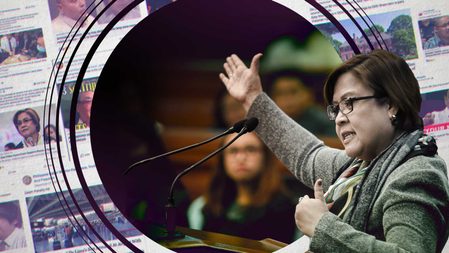
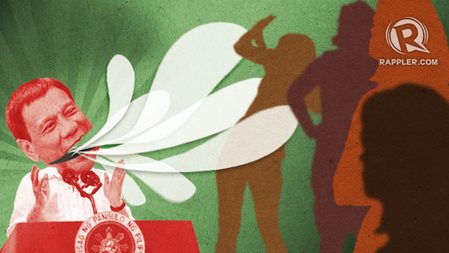
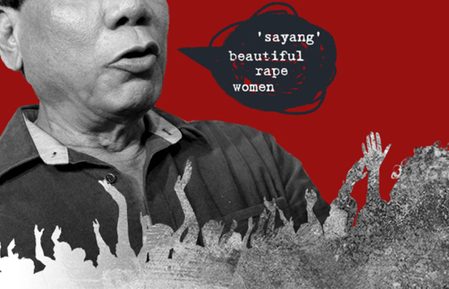
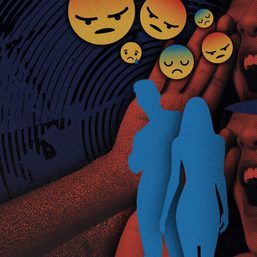

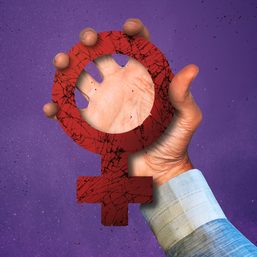
![[ANALYSIS] Cybermisogyny violates human rights](https://www.rappler.com/tachyon/2022/06/Cyber-misogyny-human-rights.jpeg?resize=257%2C257&crop_strategy=attention)
![[ANALYSIS] Building Narratives: stories of greatness and windmills in Marcos Jr.’s campaign video](https://www.rappler.com/tachyon/2022/05/Narratives-marcos-windmills-May-18-2022.jpg?resize=257%2C257&crop_strategy=attention)


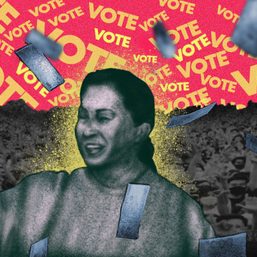
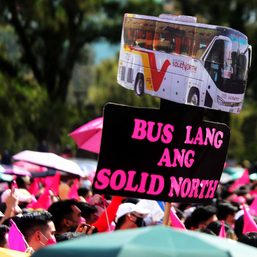
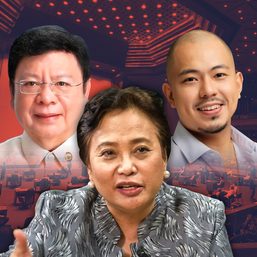



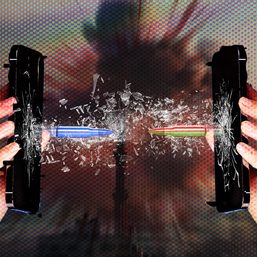

![[DECODED] The Philippines and Brazil have a lot in common. Online toxicity is one.](https://www.rappler.com/tachyon/2024/07/misogyny-tech-carousel-revised-decoded-july-2024.jpg?resize=257%2C257&crop_strategy=attention)



![[Rappler’s Best] US does propaganda? Of course.](https://www.rappler.com/tachyon/2024/06/US-does-propaganda-Of-course-june-17-2024.jpg?resize=257%2C257&crop=236px%2C0px%2C720px%2C720px)
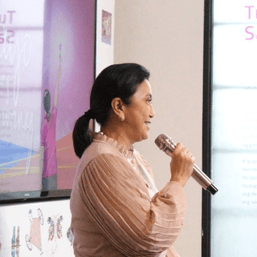

![[Newspoint] A fighting presence](https://www.rappler.com/tachyon/2024/07/thought-leaders-a-fighting-presence.jpg?resize=257%2C257&crop=441px%2C0px%2C1080px%2C1080px)
![[Closer Look] ‘Join Marcos, avert Duterte’ and the danger of expediency](https://www.rappler.com/tachyon/2024/06/TL-trillanes-duterte-expediency-june-29-2024.jpg?resize=257%2C257&crop_strategy=attention)





![[Rappler’s Best] Knowing when to leave](https://www.rappler.com/tachyon/2024/07/biden-sara-gfx.jpg?resize=257%2C257&crop_strategy=attention)
![[OPINION] Unpaid care work by women is a public concern](https://www.rappler.com/tachyon/2024/07/20240725-unpaid-care-work-public-concern.jpg?resize=257%2C257&crop_strategy=attention)




There are no comments yet. Add your comment to start the conversation.